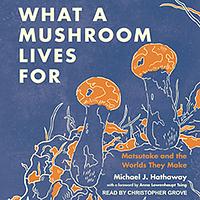Take a photo of a barcode or cover
informative
medium-paced
informative
slow-paced
Thanks to NetGalley and the publisher for sending me an advanced audio copy of this title in exchange for an honest review.
What a mushroom lives for is about the matsutake mushroom and the impact it has had on the mushroom trade in general, as well as the communities that forage for this mushroom.
Parts of this book were really interesting. I enjoyed the parts about the communities that build their lives around foraging for the matsutake, but these parts of he book didn't make up nearly as much of the book as I wanted them to.
Honestly, my biggest problem with this title was the author's attitude about plants, animals, and fungi. He calls the matsutake "a world maker" and seems to genuinely believe that all plants/animals/fungi have agency. Obviously, different types of intelligence exist, but plants and fungi don't have brains! It was so weird to me that he was basically saying that we should think about fungi and plants on the same level as people. It was really off-putting and it felt preachy. This book was meant to be able the matsutake and their impact on the world. But really it was about Hathaway telling us how we are wrong in thinking that fungi are less important than people.
What a mushroom lives for is about the matsutake mushroom and the impact it has had on the mushroom trade in general, as well as the communities that forage for this mushroom.
Parts of this book were really interesting. I enjoyed the parts about the communities that build their lives around foraging for the matsutake, but these parts of he book didn't make up nearly as much of the book as I wanted them to.
Honestly, my biggest problem with this title was the author's attitude about plants, animals, and fungi. He calls the matsutake "a world maker" and seems to genuinely believe that all plants/animals/fungi have agency. Obviously, different types of intelligence exist, but plants and fungi don't have brains! It was so weird to me that he was basically saying that we should think about fungi and plants on the same level as people. It was really off-putting and it felt preachy. This book was meant to be able the matsutake and their impact on the world. But really it was about Hathaway telling us how we are wrong in thinking that fungi are less important than people.
This book is intended for an academic audience, and was quite dry. The first half of the book is builds a foundation about the problems with a human centric world where animals, plants, and mushrooms are not viewed as having agency. The second half of the book examines the world building power of mushrooms, mainly matsutake mushrooms in creating wealth in China. There was lots of interesting information presented in the book, but at the end I was not convinced of the author’s central premise: that mushrooms have agency.
informative
reflective
slow-paced
informative
informative
inspiring
mysterious
medium-paced
With thanks to NetGalley, Micheal J Hathaway, and the publishers for providing me with an ARC in exchange for an honest review.
A wonderful book full of interesting ideas. The writing is engaging and light, though I can see it being skimmed by someone who isn’t as interested in the content as others.
I have always liked mushrooms and been interested in them generally but this is a very narrow line of interest. Hathaway has a knack for making scientific/anthropological/philosophical discussions interesting without dumbing it down.
I don’t necessarily agree with everything the author says, the concepts they argue for, or the interpretations of certain things - but it was interesting and entertaining.
It certainly isn’t a scientific/biological investigation into the internal workings of the Matsutake mushroom but rather uses the matsutake as a fulcrum with which to discuss the idea of reorganising our relationship and perception of non human entities.
An excellent addition to any interesting collection.
I enjoyed the narration by Christopher Grove, they gave an excellent performance and to my civilian ears did a great job of the scientific and LOTE pronunciation. (My standard disclaimer applies, I listen to almost all audiobooks at increased playback speed, but always listen to a portion at regular speed to get a feel for the narrator)
Minor: Xenophobia
This book describes (in medium detail) the casual racism(xenophobia?) expressed by people the author has spoken to, it’s not explicit but it could well be upsetting for those in that community.





